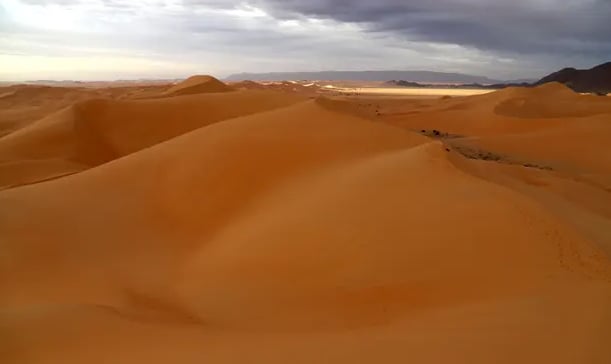June 16, 2025 | 13:30 GMT +7
June 16, 2025 | 13:30 GMT +7
Hotline: 0913.378.918
June 16, 2025 | 13:30 GMT +7
Hotline: 0913.378.918

Dust from desert storms has helped cool Earth for decades. Photo: Souleymane Ag Anara/AFP/Getty Images
Dust that billows up from desert storms and arid landscapes has helped cool the planet for the past several decades, and its presence in the atmosphere may have obscured the true extent of global heating caused by fossil fuel emissions.
Atmospheric dust has increased by about 55% since the mid-1800s, an analysis suggests. And that increasing dust may have hidden up to 8% of warming from carbon emissions.
The analysis by atmospheric scientists and climate researchers in the US and Europe attempts to tally the varied, complex ways in which dust has affected global climate patterns, concluding that overall, it has worked to somewhat counteract the warming effects of greenhouse gasses. The study, published in Nature Reviews Earth and Environment, warns that current climate models fail to take into account the effect of atmospheric dust.
“We’ve been predicting for a long time that we’re headed toward a bad place when it comes to greenhouse warming,” said Jasper Kok, an atmospheric physicist at UCLA who led the research. “What this research shows is that so far, we’ve had the emergency brake on.”
Oil refinery, owned by Exxon Mobil, the second largest in the US in Baton Rouge, Louisiana
About 26m tons of dust are suspended in our atmosphere, scientists estimate. Its effects are complicated.
Dust, along with synthetic particulate pollution, can cool the planet in several ways. These mineral particles can reflect sunlight away from the Earth and dissipate cirrus clouds high in the atmosphere that warm the planet. Dust that falls into the ocean encourages the growth of phytoplankton – microscopic plants in the ocean – that absorb carbon dioxide and produce oxygen.
Dust can also have a warming effect in some cases – darkening snow and ice, and prompting them to absorb more heat.
But after they tallied everything up, it seemed clear to researchers that the dust had an overall cooling effect.
“There are all these different factors that play into the role of mineral dusts in our atmosphere,” said Gisela Winckler, a climate scientist at the Lamont-Doherty Earth Observatory at Columbia University. “This is the first review of its kind to really bring all these different aspects together.”
Although climate models have so far been able to predict global heating with quite a bit of accuracy, Winckler said the review made clear that these predictions haven’t been able to pin down the role of dust especially well.
Limited records from ice cores, marine sediment records, and other sources suggest that dust overall had also been increasing since pre-industrial times – in part due to development, agriculture, and other human impacts on landscapes. But the amount of dust also seems to have been decreasing since the 1980s.
More data and research is needed to better understand these dust patterns, Winckler said, and better predict how they will change in coming years.
But if dust in the atmosphere is decreasing, the warming effects of greenhouse gases could speed up.
“We could start to experience faster and faster warming because of this,” Kok said. “And maybe we’re waking up to that reality too late.”
(The Guardian)

(VAN) Extensive licensing requirements raise concerns about intellectual property theft.

(VAN) As of Friday, a salmonella outbreak linked to a California egg producer had sickened at least 79 people. Of the infected people, 21 hospitalizations were reported, U.S. health officials said.

(VAN) With the war ongoing, many Ukrainian farmers and rural farming families face limited access to their land due to mines and lack the financial resources to purchase needed agricultural inputs.

(VAN) Vikas Rambal has quietly built a $5 billion business empire in manufacturing, property and solar, and catapulted onto the Rich List.

(VAN) Available cropland now at less than five percent, according to latest geospatial assessment from FAO and UNOSAT.

(VAN) Alt Carbon has raised $12 million in a seed round as it plans to scale its carbon dioxide removal work in the South Asian nation.

(VAN) Attempts to bring down the price of the Japanese staple have had little effect amid a cost-of-living crisis.